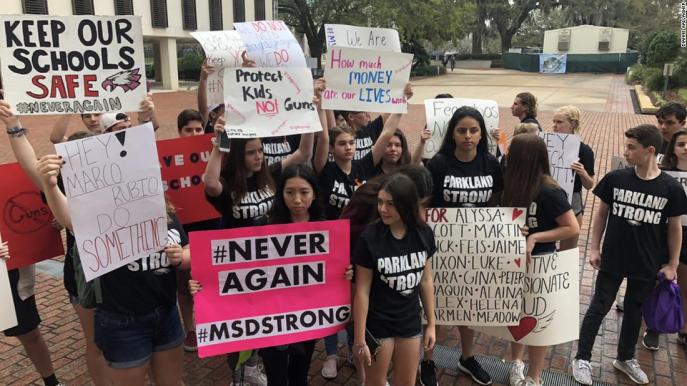 Tomorrow students in many parts of the country will participate in a national walkout to protest the increase in school gun violence. The walkout is a response to the latest mass shooting to occur at a school: the Parkland, Florida, massacre that killed 17.
Tomorrow students in many parts of the country will participate in a national walkout to protest the increase in school gun violence. The walkout is a response to the latest mass shooting to occur at a school: the Parkland, Florida, massacre that killed 17.
What is different about this movement is that it has been started by our children. In the aftermath of the shooting, students at the Marjorie Stoneman Douglas High School held a rally where they spoke out about the epidemic of mass shootings. The public stance taken by these teenagers, many of whom were vilified and accused of being media plants, has inspired students across the nation to take a similar stand.
In my local high school district, there has been a great deal of angst about the district’s response to the planned walkout tomorrow. Parents, in particular, are incensed that the district is not supporting the students’ plan to leave the building for a 17 minute protest. We should be encouraging our children’s passion for an important cause, these parents feel. They worry about the possibility of negative consequences for their children in terms of school discipline.
I wonder, though, if that shouldn’t be the point of a walkout. If a walkout is a school-sanctioned activity, what is the actual meaning of it? If it costs nothing to go outside for 17 minutes and perhaps carry a poster or listen to a fellow student’s speech, why not just hold an in-school assembly on the issue of gun violence and making our schools safer?
In his podcast “Revisionist History,” Malcolm Gladwell makes this very point in reference to recent student efforts to force the administration at Yale University to remove the name of Woodrow Wilson from school buildings, on the grounds that Wilson was an avowed racist who promoted racist policies as president. The students demanded action, yet they were not willing to refuse to attend a school that elevated a known racist.
That may sound like a drastic consequence, but it is only when people lay something on the line that their conviction speaks loudly and effects change. During the 1960s, college protesters braved not only disciplinary action in protesting the Vietnam War, they faced tear gas, arrest, and even, in some tragic cases, death for their convictions.
I’m not suggesting our children face riot police in order to make a point about school violence and the need to change our laws to make schools safer places. And I’m not opposed to school administrations that decide to allow or facilitate their students’ walkouts tomorrow. But I think children and their parents need to be willing to face opposition to stand up for their beliefs.
Whatever happens tomorrow at my daughter’s school and at schools across the country, I hope that the movement marks a turning point in our response to gun violence, not only at schools, but in all places in the U.S. And I hope that, whatever the consequence, my daughter learns something about individual and collective responsibility for making our world a better place.
Mary, I read an article about this very thing. It was reported that Downers Grove high school district gave detentions to all students in both high schools who participated in the walkout. Later some of the students were reported to have said that they considered their detentions a badge of honor.
LikeLiked by 1 person
Exactly
LikeLike